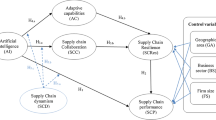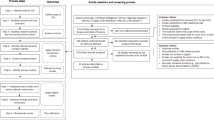Abstract
Mass customization (MC) often implies a value chain with several spatially distributed actors that require extensive coordination. Agent technology is beginning to be utilized in supply chain management because of its ability to facilitate collaboration and coordination. Thus, agents are suitable for constructing MC environments and interfacing the various participants working together to archive the common goal of producing customized goods. This paper presents a multi-agent system architecture for MC, which takes into account the coordination problems that exist in MC. Because of asymmetric and incomplete knowledge bases, agents may be limited in global planning and scheduling. Therefore, we suggest a three-tier model of coordination and utilize partial global plans for addressing the coordination problem. Finally, we provide an example application and a prototype implementation for the MC coordination.










Similar content being viewed by others
References
Ahn HJ, Lee H, Park SJ (2003) A flexible agent system for change adaptation in supply chains. Expert Syst Appl 25(4):603–618
Baker A, Van Dyke Parunak H, Erol K (1999) Agents and the internet: infrastructure for mass customization. IEEE Internet Comput 3(5):62–69
Barbuceanu M, Fox MS (1996) Coordinating Multiple agents in the supply chain. In: Proceedings of fifth workshop on enabling technologies: infrastructure for collaborative enterprises. IEEE Computer Society Press, Stanford, , pp 134–142
Blecker Th, Graf G (2003) Multi agent systems in internet based production environments—an enabling infrastructure for mass customization. In: Piller FT, Reichwald R, Tseng M (eds) Proceedings of the 2003 world congress on mass customization and personalization (MCPC2003), Munich 2003
Brun A, Portioli A (1999) Effective supply-chain coordination: an investigation. In: Proceedings of the second international conference on autonomous agents, Seattle
Cavalieri S, Cesarotti V, Introna V (2003) A Multiagent Model for Coordinated Distribution Chain Planning. J Organ Comput Electr Commerce 13(3 & 4):267–287
Chen YH, Wang YZ, Wong MH (2001) A Web-Based Fuzzy Mass Customization System. J Manufact Syst 20(4):280–287
Coates J (1995) Customization promises sharp competitive edge. Res Technol Manage 38(6):6–7
Davidsson P, Wernstedt F (2002) A multi-agent system architecture for coordination of just-in-time production and distribution. Knowl Eng Rev 17(4):317–329
Decker KS, Lesser VR (1995) Designing a family of coordination algorithms. In: Lesser V (ed) Proceedings of the first international conference on multi-agent systems (ICMAS’95), Francisco, CA, pp 73–80
Dietrich AJ, Timm IJ, Kirn St (2003) Implications of mass customization on business information systems. In: Piller FT, Tseng M (eds) Proceedings of the 2003 world congress on mass customization and personalization (MCPC2003), Munich 2003
Dietrich AJ, Kirn St (2005) Flexible Wertschöpfungnetzwerke in der kundenindividuellen Massenfertigung. Ein service-orientiertes Modell für die Schuhindustrie. In: Ferstl OK, Sinz EJ, Eckert S, Isselhorst T (eds.) Wirtschaftsinformatik 2005. eEconomy, eGovernment, eSociety, Bamberg, pp 23−42
Durfee EH, Lesser VR (1991) Partial global planning: a coordination framework for distributed hypothesis formation. IEEE transactions on systems, man, and cybernetics, vol 21, No 5, pp 1167–1183. http://citeseer.nj.nec.com/durfee91partial.html
Durfee EH, Lesser VR (1987) Using partial global plans to coordinate distributed problem solvers. Proceedings of the tenth intl joint conf on artificial intelligence (IJCAI-87), Milan, Italy, pp 875–883
EuroShoe Consortium (2002) The market for customized footwear in Europe: market demand and consumer’s preferences. In: Frank T Piller (ed) EuroShoe project report from the european fifth framework program. Munich/Milan. http://www.itia.cnr.it/Euroshoe/links/EuroShoe_Footwear_Market_Study. pdf. Access: 2004-10-10
Fink A (2004) Supply chain coordination by means of automated negotiations. In: Proceedings of the 37th hawaii international conference on system sciences (HICSS’04), Big Island, Hawaii, January 05–08, pp 30070.3
Fleischmann B, Meyr H, Wagner M (2001) Supply chain planning. In: Sebastian HJ, Grünert T (eds) Logistik management. Stuttgart
Fox MS, Barbuceanu M, Teigen R (2000) Agent-oriented supply chain management. Int J Flex Manuf Syst 12:165–188
Ghiassi M, Spera C (2003) Defining the Internet-based supply chain system for mass customized markets. Comput Ind Eng 45(1):17–41
Grosz BJ (1996) Collaborative systems. AI Mag 17(2):67–85
Grosz BJ, Kraus S (1996) Collaborative plans for complex group action. Artif Intell 86(2):269–357
Grosz BJ, Sidner CL (1990) Plans for discourse. In: Cohen PR, Morgan J, Pollack M E (eds) Intentions in communication. MIT Press, Cambridge, pp 417–444
Gupta A, Whitman L, Agarwal RK (2001) Supply chain agent decision aid system (SCADAS). In: Proceedings of the 2001 winter simulation conference, pp 553–559
He M, Jennings NR, Leung H (2003) On agent-mediated electronic commerce. IEEE Trans Knowl Data Eng15(4):985–1003
Jennings NR (1995) Controlling cooperative problem solving in industrial multi-agent systems using joint intentions. Artif Intell 75(2):195–240
Kaihara T (2003) Multi-agent based supply chain modelling with dynamic environment. Int J Prod Econ 85(2):263–269
Kirn S, Schlageter G (1991) Competence evaluation in federative problem solving - how to make expert systems cooperative. In: Conference on 2nd generation expert systems, Avignon, France
Kirn S (1992) Coordinating autonomous problem solvers: The 2 dimensions of nested negotiations. In: Vogt F (ed) Information processing 92. Proceedings of the 12th world computer congress volume III: intelligent systems and personal computers, Madrid, Spain
Krizner K (2001) Individuality extends into manufacturing. Frontline Solutions 2(3):18–22
Levesque HJ, Cohen PR, Nunes JTH (1990) On acting together. In: Proceedings of eighth national conference on artificial intelligence (AAAI-90), Boston, pp 94–99
McCaulley-Bell P (1999) Intelligent agent characterization and uncertainty management with fuzzy set theory: a tool to support early supplier integration. J Intell Manuf 10(2):135–147
Neubert G, Ouzrout Y, Bouras A (2004) Collaboration and integration through information technologies in supply chains. Int J Technol Manage 28(2):259–273
Nissen M (2001) Agent-based supply chain integration. Inform Technol Manage 2(3):289–312
Park JH, Park SC (2003) Agent-based merchandise management in business-to-business electronic commerce. Decis Support Syst 35(3):311–333
Piller FT (2003) Mass Customization. Ein wettbewerbsstrategisches Konzept im Informationszeitalter. Wiesbaden 2003
Pine BJ II (1993) Mass customization: the new frontier in business competition. Harvard Business School Press, Boston
Rautenstrauch C, Turowski K (1999) A virtual enterprise model for mass customization. In: Nahavandi S, Saadat M (eds) Proceedings of the second world manufacturing congress (WMC’99), international symposium on manufacturing systems (ISMS’99). Durham, pp 777–783
Reichwald R, Piller F, Möslein K (2000) Information as a critical success factor for mass customization, or: why even a customized shoe not always fits. In: Proceedings of ASAC-IFSAM conference, Montreal, July 8–11
Sadeh NM, Hildum D, Kjenstad D (2003) Agent-based e-supply chain decision support. J Organ Comput Electr Commerce 13(3 & 4):225–241
Shen W (2002) Distributed manufacturing scheduling using intelligent agents. IEEE Intell Syst 17(1):88–94
Sikora R, Shaw MJ (1998) A multi-agent framework for the coordination and integration of information systems. Manage Sci 44(11):65–78
Schlueter-Langdon C, Sikora R (2003) Conceptualizing coordination and competition in supply chains as complex adaptive system: an exploratory analysis. In: Proceedings of the second workshop on e-business (WeB2003). Seattle, December 13–14, pp 322–328
Swaminathan JM, Smith SF, Sadeh NM (1998) Modeling supply chain dynamics: a multiagent approach. Decis Sci 29(3):607–632
Tambe M (1997) Towards flexible teamwork. J Artif Intell Res 7:83–124
Timm IJ, Knirsch P, Herzog O, Tönshoff HK, Woelk P-O (2001) Mass Customization als Chance für KMU: Kooperative Agenten für die Informationslogistik. In: Sebastian H-J, Grünert T (eds) logistik management—supply chain management and e-business. BG Teubner Verlag, Stuttgart, pp 401–409
Tönshoff HK, Woelk P-O, Herzog O, Timm IJ, Böß V (2002) Agent-based in-house process planning and production control for enterprises in supply chains. In: Sullivan WG et al (eds) 12th international conference on flexible automation & intelligent manufacturing, Dresden, pp 329–338
Tseng MM, Piller FT (eds) (2003) The customer centric enterprise: advances in mass customization and personalization. Springer, Berlin Heidelburg New York
Turowski K (1999) Agenten-gestützte Informationslogistik für Mass Customization. In: Kopfer H, Bierwirth C (eds) Logistik management—intelligente I+K technologien. Berlin, pp 199–209
Vakharia A (2002) e-Business and supply chain management. Decis Sci 33(4):495–504
van Fenema PC (2002) Coordination and Control of globally distributed software projects. Doctoral Dissertation, Erasmus Research Institute of Management (ERIM), Erasmus University Rotterdam, ISBN 90-5892-030-5
Weiss G (ed) (1999) Multiagent systems. A modern approach to distributed artificial intelligence. Cambridge, Massachusetts
Yung SK, Yang CC, Lau ASM, Yen J (2000) Applying multi agent technology to supply chain management. J Electr Commerce Res 1(4):119–132
Acknowledgements
Part of this work has been funded by the German Federal Ministry for Education and Research (BMBF) within the research project “EwoMacs” (02PD1121). The authors would like to thank Yll Mujaj, Stephan Otto, Christian Loos, and Matthias Bernstein for their efforts in the prototype implementation.
Author information
Authors and Affiliations
Corresponding author
Rights and permissions
About this article
Cite this article
Sugumaran, V., Dietrich, A.J. & Kirn, S. Supporting mass customization with agent-based coordination. ISeB 4, 83–106 (2006). https://doi.org/10.1007/s10257-005-0006-5
Published:
Issue Date:
DOI: https://doi.org/10.1007/s10257-005-0006-5




